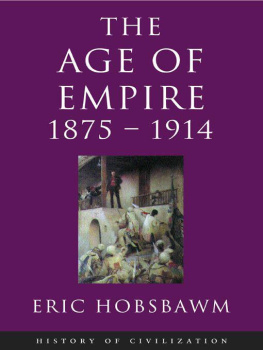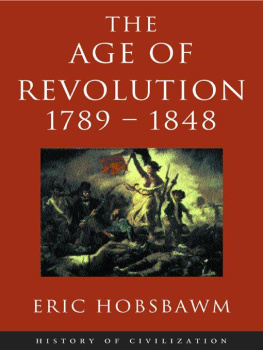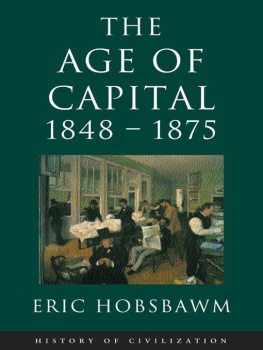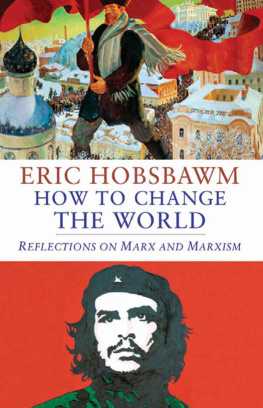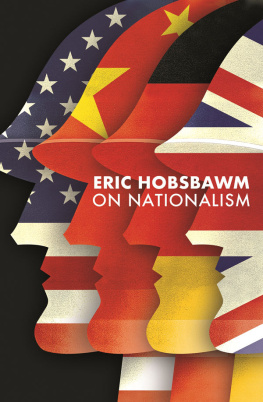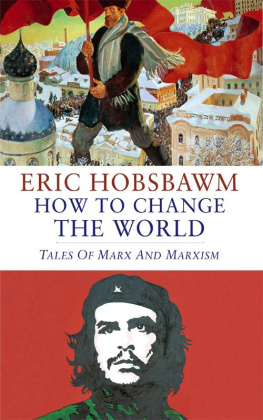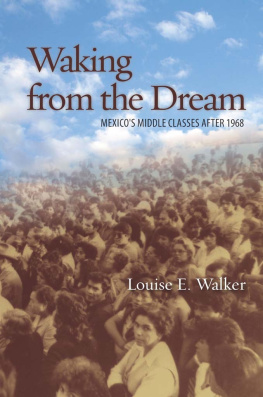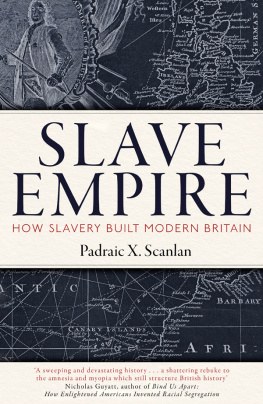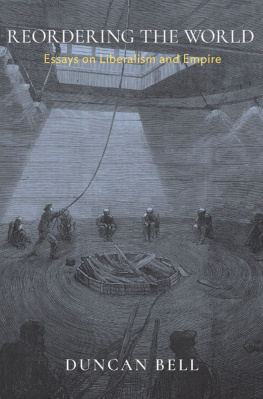Eric Hobsbawm was born in Alexandria in 1917 and was educated in Vienna, Berlin, London and Cambridge. A Fellow of the British Academy and the American Academy of Arts and Sciences, with honorary degrees from universities in several countries, he taught until retirement at Birkbeck College, University of London, and since then at the New School for Social Research in New York.
Also by Eric Hobsbawm
The Age of Revolution 17891848
The Age of Capital 18481875
Age of Extremes 19141991
The Age of
Empire
18751914
ERIC HOBSBAWM
CONTENTS
MAPS
PREFACE
Though written by a professional historian, this book is addressed not to other academics, but to all who wish to understand the world and who believe history is important for this purpose. Its object is not to tell readers exactly what happened in the world during the forty years before the First World War, though I hope it will give them some idea of the period. If they want to find out more, they can easily do so from the large and often excellent literature, much of which is easily available in English to anyone who takes an interest in history. Some of it is indicated in the guide to Further Reading.
What I have tried to do in this volume, as in the two volumes which preceded it (The Age of Revolution 17891848 and The Age of Capital 18481875) is to understand and explain the nineteenth century and its place in history, to understand and explain a world in the process of revolutionary transformation, to trace the roots of our present back into the soil of the past and, perhaps above all, to see the past as a coherent whole rather than (as historical specialization so often forces us to see it) as an assembly of separate topics: the history of different states, of politics, of the economy, of culture or whatever. Ever since I began to be interested in history, I have always wanted to know how all these aspects of past (or present) life hang together, and why.
This book is therefore not (except incidentally) a narrative or a systematic exposition, and still less a display of scholarship. It is best read as the unfolding of an argument, or rather, the tracing of a basic theme through the various chapters. Readers must judge whether the attempt is convincing, though I have done my best to make it accessible to non-historians.
There is no way of acknowledging my debts to the many writers whose works I have pillaged, even as I often disagreed with them, and still less my debts to the ideas I have obtained over the years in conversation with colleagues and students. If they recognize their own ideas and observations, they can at least blame me for getting them or the facts wrong, as I have certainly done from time to time. I can, however, acknowledge those who made it possible to pull a long preoccupation with this period together into a single book. The Collge de France enabled me to produce something like a first draft in the form of a course of thirteen lectures in 1982; I am grateful to this august institution and to Emmanuel Le Roy Ladurie who instigated the invitation. The Leverhulme Trust gave me an Emeritus Fellowship in 19835, which allowed me to get research help; the Maison des Sciences de lHomme and Clemens Heller in Paris, as well as the World Institute for Development Economics Research of the United Nations University and the Macdonnell Foundation, gave me the possibility of a few quiet weeks in 1986 to finish the text. Among the people who assisted me in research I am particularly grateful to Susan Haskins, Vanessa Marshall and Dr Jenna Park. Francis Haskell read the chapter on the arts, Alan Mackay those on the sciences, Pat Thane that on womens emancipation, and preserved me from some, but I am afraid not from all, error. Andr Schiffrin read the entire manuscript as a friend and exemplar of the educated non-expert to whom this book is addressed. I spent many years lecturing on European history to the students of Birkbeck College, University of London, and I doubt whether I would have been able to envisage a history of the nineteenth century in world history without this experience. So this book is dedicated to them.
OVERTURE
Memory is life. It is always carried by groups of living people, and therefore it is in permanent evolution. It is subject to the dialectics of remembering and forgetting, unaware of its successive deformations, open to all kinds of use and manipulation. Sometimes it remains latent for long periods, then suddenly revives. History is the always incomplete and problematic reconstruction of what is no longer there. Memory always belongs to our time and forms a lived bond with the eternal present; history is a representation of the past.
Pierre Nora, 1984
Merely to recount the course of events, even on a world-wide scale, is unlikely to result in a better understanding of the forces at play in the world today unless we are aware at the same time of the underlying structural changes. What we require first of all is a new framework and new terms of reference. It is these that the present book will seek to provide.
Geoffrey Barraclough, 1964
I
In the summer of 1913 a young lady graduated from secondary school in Vienna, capital of the empire of AustriaHungary. This was still a fairly unusual achievement for girls in central Europe. To celebrate the occasion, her parents decided to offer her a journey abroad, and since it was unthinkable that a respectable young woman of eighteen should be exposed to danger and temptation alone, they looked for a suitable relative. Fortunately, among the various interrelated families which had advanced westwards to prosperity and education from various small towns in Poland and Hungary during the past generations, there was one which had done unusually well. Uncle Albert had built up a chain of stores in the Levant Constantinople, Smyrna, Aleppo, Alexandria. In the early twentieth century there was plenty of business to be done in the Ottoman Empire and the Middle East, and Austria had long been central Europes business window on the orient. Egypt was both a living museum, suitable for cultural self-improvement, and a sophisticated community of the cosmopolitan European middle class, with whom communication was easily possible by means of the French language, which the young lady and her sisters had perfected at a boarding establishment in the neighbourhood of Brussels. It also, of course, contained the Arabs. Uncle Albert was happy to welcome his young relative, who travelled to Egypt on a steamer of the Lloyd Triestino, from Trieste, which was then the chief port of the Habsburg Empire and also, as it happened, the place of residence of James Joyce. The young lady was the present authors future mother.
Some years earlier a young man had also travelled to Egypt, but from London. His family background was considerably more modest. His father, who had migrated to Britain from Russian Poland in the 1870s, was a cabinet-maker by trade, who earned an insecure living in East London and Manchester, bringing up a daughter of his first marriage and eight children of the second, most of them already born in England, as best he could. Except for one son, none of them was gifted for business or drawn to it. Only one of the youngest had the chance to acquire much schooling, becoming a mining engineer in South America, which was then an informal part of the British Empire. All, however, were passionate in the pursuit of English language and culture, and anglicized themselves with enthusiasm. One became an actor, another carried on the family trade, one became a primary school teacher, two others joined the expanding public services in the form of the Post Office. As it happened Britain had recently (1882) occupied Egypt, and so one brother found himself representing a small part of the British Empire, namely the Egyptian Post and Telegraph Service, in the Nile delta. He suggested that Egypt would suit yet another of his brothers, whose main qualification for making his way through life would have served him excellently if he had not actually had to earn a living: he was intelligent, agreeable, musical and a fine all-round sportsman as well as a lightweight boxer of championship standard. In fact, he was exactly the sort of Englishman who would find and hold a post in a shipping office far more easily in the colonies than anywhere else.

